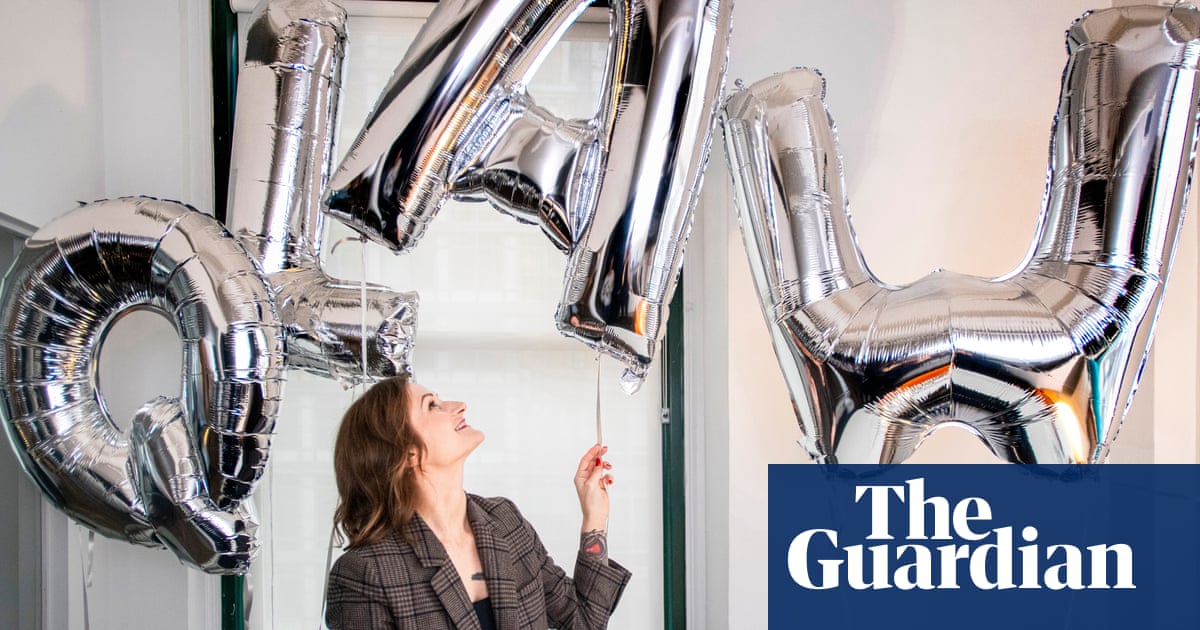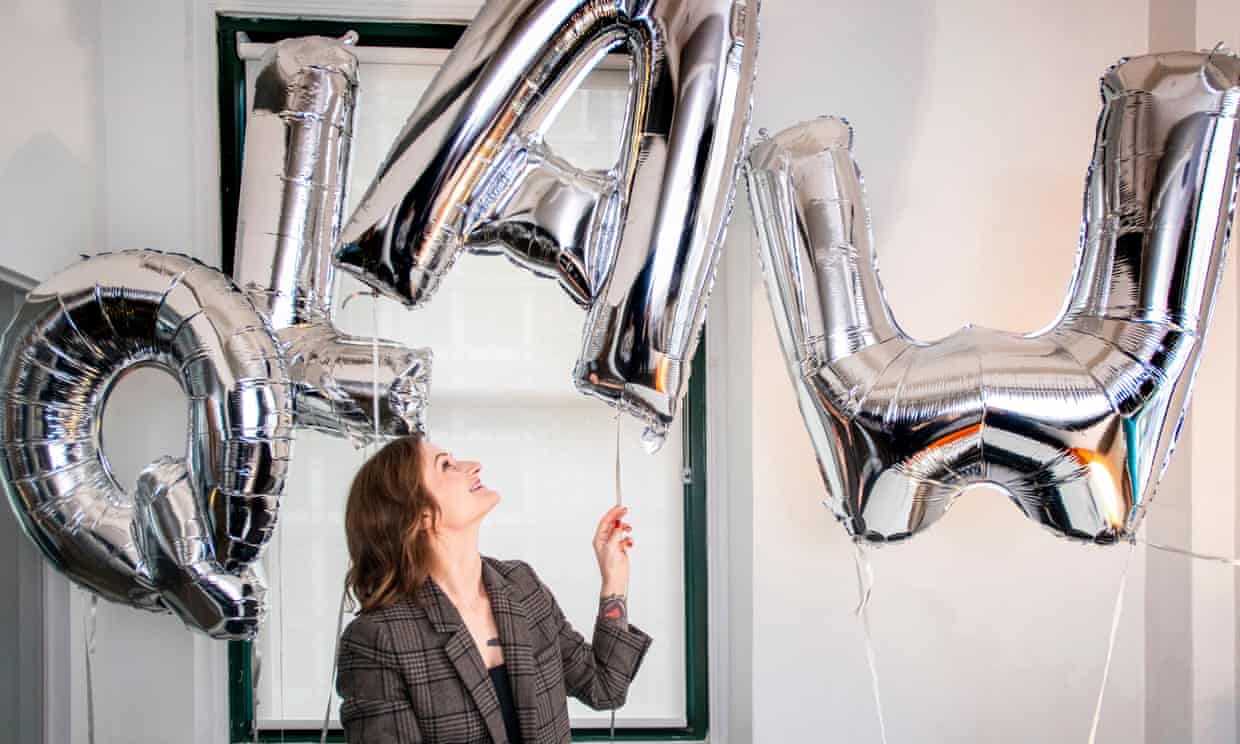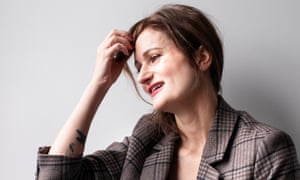‘AA’s rules are for men’: Holly Whitaker on how women can stop drinking – and get happy


When Holly Whitaker looks back on the many nights that would disappear in a boozy haze, it wasn’t the anxiety and regret that made her realise she needed to get help for her drinking, but sheer exhaustion. Each weekend, while hungover, she would wearily erase all evidence of her drinking binges: the stains on her bed, the empty bottles, the rubbish bags. She was holding it together with a lucrative job as the director of a healthcare startup, had a great flat in San Francisco and a busy social life, but suddenly she just couldn’t do it any more.
“When I binged, I would close my eyes while I did it,” she says. “I was trying to not see how horrific it was. I would go through this process of scrubbing it away, then presenting myself to the world and pretending that nothing was wrong. Then I had this moment when I couldn’t not see it.”
She did what many people with a drinking problem do: she went to Alcoholics Anonymous (AA). But, after several months of attending meetings, she realised that the 12-step programme wasn’t working for her. The programme’s guidelines, created in 1939, centre on appealing to a higher power and renouncing the ego. How, she wondered, could this possibly serve women or minorities who historically have been powerless? “These are rules written for men in the 1930s. They’re not written for women. They’re for the people who sit at the top of our society. The archetype is a man with an overdeveloped sense of owning the world. That’s not women or any other marginalised human.”
Since it was founded in 1935 by Bill Wilson and Bob Smith in Akron, Ohio, AA has become the most popular addiction recovery programme in the world. While Whitaker is keen to point out that “plenty of my friends have gotten sober through AA”, it is not without its critics. Some have challenged its belief that alcoholism is a disease, while others have questioned the religious aspect of the organisation, which asks members to turn their lives over to God as part of the 12 steps.
Its success rate has also been disputed. A long-term study on AA (a free mutual-aid society that has about 40,000 members in the UK) by the National Institute on Alcohol Abuse and Alcoholism in 2011 found that 49% of its members were still abstinent after eight years. Getting accurate figures for alcohol treatment programmes is hard because many participants want to remain anonymous, but a former Harvard psychiatry professor Lance Dodes claimed in his 2014 book, The Sober Truth: Debunking the Bad Science Behind 12-Step Programs and the Rehab Industry, that it was effective for between only 5% and 8% of people.
Whitaker, now 40, details her own path to recovery in Quit Like a Woman, which is part examination of how patriarchy drives women to drink and part practical guide on how to tackle addiction. She credits Allen Carr’s manual The Easy Way to Control Alcohol with helping her break free aged 33, as well as therapy and meditation. Breathing exercises, using mantras, not drinking caffeine after noon, and getting at least seven hours of sleep are just some of the tips she recommends.
Dejected by her experience with AA, she decided to create Tempest, an online sobriety school aimed at women and minority groups. It has a gentler approach, which focuses on seeing its users as “whole and perfect” people living in a broken system. But it’s not cheap – its eight-week programme costs $547 (£416), although it does offer a reduced rate of $197 for those from disadvantaged backgrounds.
“There are very few things that are inherently built around the unique experience of what it means to be a woman,” she says. “We assume our clients need to be built up, that they need love over punishment, that they need to learn how to exist within their bodies and feel safe within this world. It’s a feminine-centric system, but men do very well in our programme.”
Rather than demanding that addicts go cold turkey and chastising them for slipping up, Tempest regards any lapses as part of the process. AA expects total abstinence from its members, but Whitaker claims this “creates too high a bar” and people end up feeling “helpless” and “defeated” if they fail to achieve this. This “stop doing it” approach, Whitaker believes, is “masculine-centric” and implies that if you do slip up “you are kind of stupid”. “In our model, it is about being trusted to make your own mistakes and to learn from them.”
Whether alcoholics should quit drinking completely or can drink in moderation has been much discussed. Researchers at the University of Gothenburg in 2016 found that 90% of patients who abstained were still sober two and a half years after treatment, compared with 50% of those who tried moderate drinking.
One thing is clear: women are drinking more than ever. High-risk drinking, defined as having four or more drinks at least one day a week, rose for women by 58% from 2001 to 2013, according to a 2017 study by the journal JAMA Psychiatry. British women were found to drink an average of three drinks (defined as 10g of alcohol) a day in a 2018 survey and were ranked eighth in the world for high levels of drinking.
Whitaker blames alcohol companies for this increased consumption. “Very smart people with assloads of money, power and access benefit from … our believing that drinking is an act of empowerment for women, instead of what it is: a drug designed to keep us down, no matter how much we drink,” she writes. For instance, there’s the glorification of “wine o’clock” – where women are encouraged to relax with some hard-earned drinks after a hectic day. Advertising campaigns focus on cosy girls’ nights in, while busy parents refer to their daily glass of pinot grigio as “mummy juice”.
Baileys sponsored the Women’s prize for fiction between 2014 and 2017 while Budweiser is a partner of the England women’s football team. Smirnoff’s Equalising Music initiative has been promoting gender equality in the music industry while Diageo, the alcoholic-drinks company (which owns Baileys and Smirnoff) is an official supporter of International Women’s Day. This can backfire: BrewDog, a brewery based in Scotland, was derided after it relaunched its Punk IPA as Pink IPA, and called it “beer for girls”.

Then there’s the threat it poses to women’s safety. “It’s the No 1 date rape drug,” says Whitaker. “It is tied to sexual assault and a large portion of domestic violence. It’s something that we use without understanding the consequences of it.”
A 2005 study into drug-facilitated sexual assault found that alcohol was the most commonly used substance in more than 1,000 cases. Home Office figures from 2013/14 revealed that 36% of domestic violence incidents were alcohol-related. For Whitaker, a patriarchal society has created an unbearable bind for women that drives many to drink. “There is this essential quality to a woman’s existence where our roles are carved out for us. We are swimming in this cesspool of our own subservience. We know what we should look like. We know all of these things about what it means to make it.
“‘Making it’ looks like having a specific career, a marriage, being a mother or having all of those things and balancing them. If we can’t or if we don’t even fit into that picture, there’s just this sense of consistently growing up with a wrongness. Trying to become what we’re told we should become leads to an impossible situation that we have to manage with other external tools like drinking, drugs or food to make it work.”
Alcohol, she is convinced, will go the way of cigarettes. Once considered an innocuous habit, smoking is now banned in enclosed public spaces and packets come with graphic health warnings. But until then “there’s a very large industry run by men where women and other demographics are targeted specifically, in ways that tell us that drinking is normal. If you can’t drink, it’s your fault.”
For now, Whitaker is content. She is not looking for anything or anyone to fill the void. Addiction, she says, is the best thing that ever happened to her. “This was an opportunity to look at the ways that I was in pain. It allowed me to unpack that and to start to heal.”
It took her six months to get sober, and she has not had a drink since 2013. Has she ever been tempted to relapse? “I can say with certainty, I’ll never have a drink again. I don’t want to. I prefer this so much more. Alcohol is just a cheap substitute for real life.”
Quit Like a Woman by Holly Whitaker is published by Bloomsbury (£14.99). To buy a copy for £13.19 with free UK p&p for orders over £20, visit guardianbookshop.com or call 0203 176 3837. The charity Alcohol Change UK (alcoholchange.org.uk) offers advice on issues related to drinking.
 Pathways Drug Rehabilitation Luxury Addiction Treatment & Detox Center
Pathways Drug Rehabilitation Luxury Addiction Treatment & Detox Center


